Before Berry Gordy There Was Joe Von Battle Producing Records in Detroit
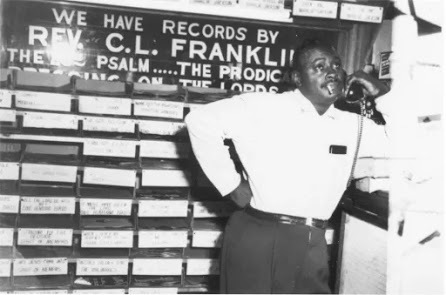 Joe Von Battle in his Hastings Street record shop
Joe Von Battle in his Hastings Street record shopJoe Von Battle was born in 1915 in Macon, Georgia and moved during the Great Migration with his family to Detroit, Michigan. In his teens, he worked doing odd jobs in Detroit’s famous Eastern Market until he found work with Detroit Edison digging trenches and burying electrical lines. During much of World War II, Joe worked double shifts. One shift at the Hudson Motor Car Company and the other shift at the Chrysler Plant across the street. When the war ended, Joe was permanently laid off like many other African American workers, displaced by White veterans returning from the war.
Joe Battle vowed to be his own boss and never work for anyone again. He added Von for a middle name as a young man, emulating European film actor Erich Von Stroheim, who he admired. When he opened his record business, he realized it was helpful on his business cards, obscuring his African American ancestory. In 1945, a narrow grocery storefront was vacated at 3530 Hastings Street in Detroit’s Black Bottom neighborhood on the lower Eastside, Joe Von Battle stepped in and opened Joe’s Record shop.
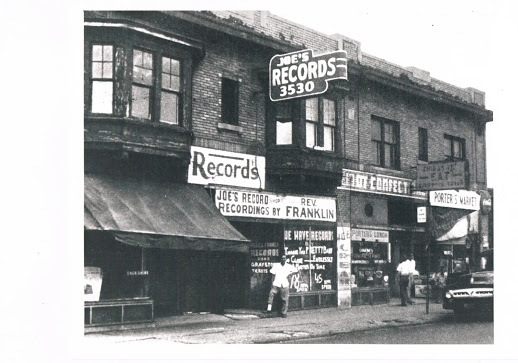 Joe outside his store
Joe outside his storeIn 1948, Joe Von Battle purchased a reel-to-reel tape recorder and made a makeshift recording studio in the back of his shop. There he recorded artists like John Lee Hooker; Washboard Willie; pianist Detroit Count, who recorded “Hastings Street Opera;” Tamp Red who recorded “Detroit Blues;” Louisiana Red, Memphis Slim, Kenny Burrell, and many other country blues musicians.
Joe Von Battle recorded the final songs and sounds of the people who migrated north for a better life. His shop specialized in records that appealed to African Americans from the rural South who left to work in the automobile or steel industries for a better life. Country blues traveled with them. Joe is believed by music historians to be the first African American record producer in the post war period recording on the JVB, Von, and Battle Records labels.
His record shop played host to Detroit’s itinerate blues musicians. Typically, the music was performed live by a singer with his guitar and maybe a washboard and a harmonica player for accompaniment. Country blues was raw and rooted in the struggle for survival in a world of inherited misery. It sung about poverty, loss, suffering, desertion, death, booze, and loneliness. Country blues had its feet firmly grounded to the earth and rural life.
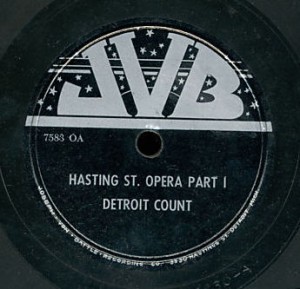 Joe recorded another style of music with a hopeful spiritual message born out of the same misery—gospel music. Joe was most proud of the over one-hundred sermons he recorded of legendary pastor C.L. (Clarence La Vaughn) Franklin at the original New Bethel Baptist Church on Hastings Street down from his record shop. On Sundays, Joe would broadcast Reverend Franklin’s sermons on speakers set up outside the shop, his storefront always attracted a crowd.
Joe recorded another style of music with a hopeful spiritual message born out of the same misery—gospel music. Joe was most proud of the over one-hundred sermons he recorded of legendary pastor C.L. (Clarence La Vaughn) Franklin at the original New Bethel Baptist Church on Hastings Street down from his record shop. On Sundays, Joe would broadcast Reverend Franklin’s sermons on speakers set up outside the shop, his storefront always attracted a crowd. Probably the most precious recordings he ever recorded were eight hymns sung by Reverend Franklin’s fourteen-year-old daughter Aretha before she signed with Columbia Records in 1960 secularizing her music. When Aretha Franklin signed with Atlantic Records in 1966, she was paired with producer Jerry Wexler who helped her become the Queen of Soul.
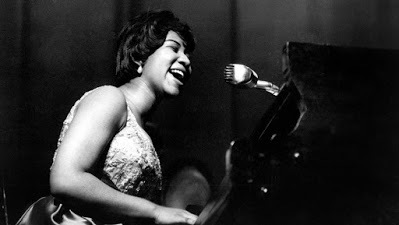 Aretha Franklin performing
Aretha Franklin performingIn 1956, the Federal government announced the construction of the National Interstate Highway System spelling doom for Hastings Street, the heart of Detroit’s African American business community and further down Hasting’s Street Paradise Valley, Detroit’s legendary blues and jazz entertainment district. The construction of I-375 was a useless 1.062-mile spur that ran parallel to I-75. When the Black business community was uprooted, the financial health of many successful African American entrepreneurs was cut short.
The transition prompted a Black diaspora to the 12thStreet area on Detroit’s Westside creating overcrowding and increased racial tension in the city. The Black community was boxed in by real estate covenants and red lining restricting their free movement around the city and the greater Detroit area.
Joe Von Battle moved his record shop to 12thStreet in 1960, but by that time there was a new sound dominating the radio and television airways of Detroit threatening his business. “There is a different generation now,” Joe told the Detroit Free Press. “All they want to buy is that Motown stuff with that beat, and they want to dance. Today, young disc jockeys won’t play the blues. They say it’s degrading,”
Berry Gordy brought a polished professionalism and aggressive promotion to his Gordy/Tamla/Motown record labels. The new urban sound was sleek, suave, and sophisticated appealing to a broader, younger, crossover audience. The content of the music changed from the tough realism of the country blues to lyrical, hard-driving rhythms and strong choral arrangements with a strong pop music flavor.
The modern male and female groups wore fancy, matching outfits and danced synchronized choreography to the music. The Motown sound was tailormade for television and radio, taking the new music from Detroit’s Westside to the rest of the country and the globe.
Not only did the music change, the record industry changed also. In the 1960s when the chain department stores established record departments, they began selling rhythm and blues singles and albums. Rhythm and blues entered the mainstream. Independent, specialty record shops could not compete.
Then on July 23, 1967, as if to add insult to injury, 12thStreet erupted with racial strife and conflagration. The first night Joe protected his store with a weapon but the second day he was ordered by police to evacuate the premises and allow the authorities to restore order. That took a week.
In the meantime, Joe’s business was looted, torched, and hosed down by the fire department. When Joe and his family were allowed to return to the record shop, the smell of charred wood and melted vinyl hung heavy in the air. Twenty years of tape-recorded blues history, Joe’s life work, went up in smoke or down the drain.
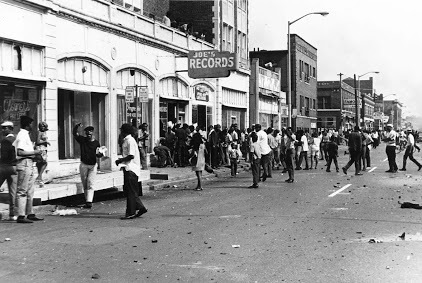 Looters oustside of Joe's shop in July 1967
Looters oustside of Joe's shop in July 1967
Joe’s daughter Marsha laments that “Some of the most significant voices in recorded history were on those melted and fire-soaked reel-to-reel tapes. Thousands of songs, sounds, and voices of the era—most never pressed into vinyl—were gone forever. I believe Daddy died that day. My father’s alcoholism gravely worsened after his life’s work and provision for his family was destroyed by looters and rioters.” Joe also suffered for years with Addison’s disease and died a broken man in 1973 at the young age of fifty-seven.
***
Marsha Battle Philpot—aka Marsha Music—wrote a biography about her father to document his music legacy. Marsha brought Joe Von Battle's story back to life in 2008 in her Marsha Music: The Detroitist blog. She writes about Detroit's African American history on her blog.
Marsha Battle Philpot also has published a beautifully written book of poetry and prose titled The Detroitist: An Anthology About Detroit dealing with the era of Detroit's white flight in the 1950s and 1960s and its impact on those left behind.



